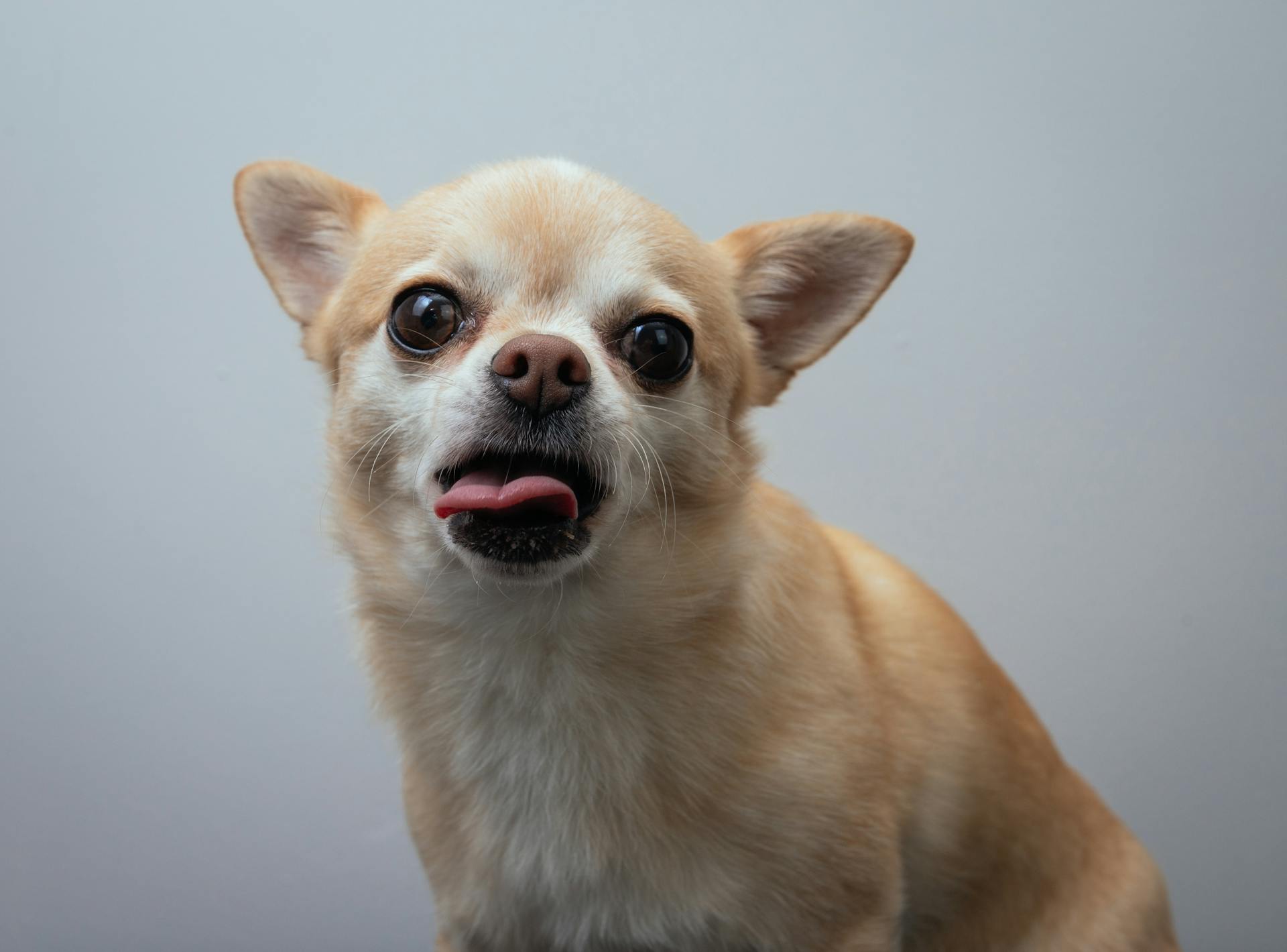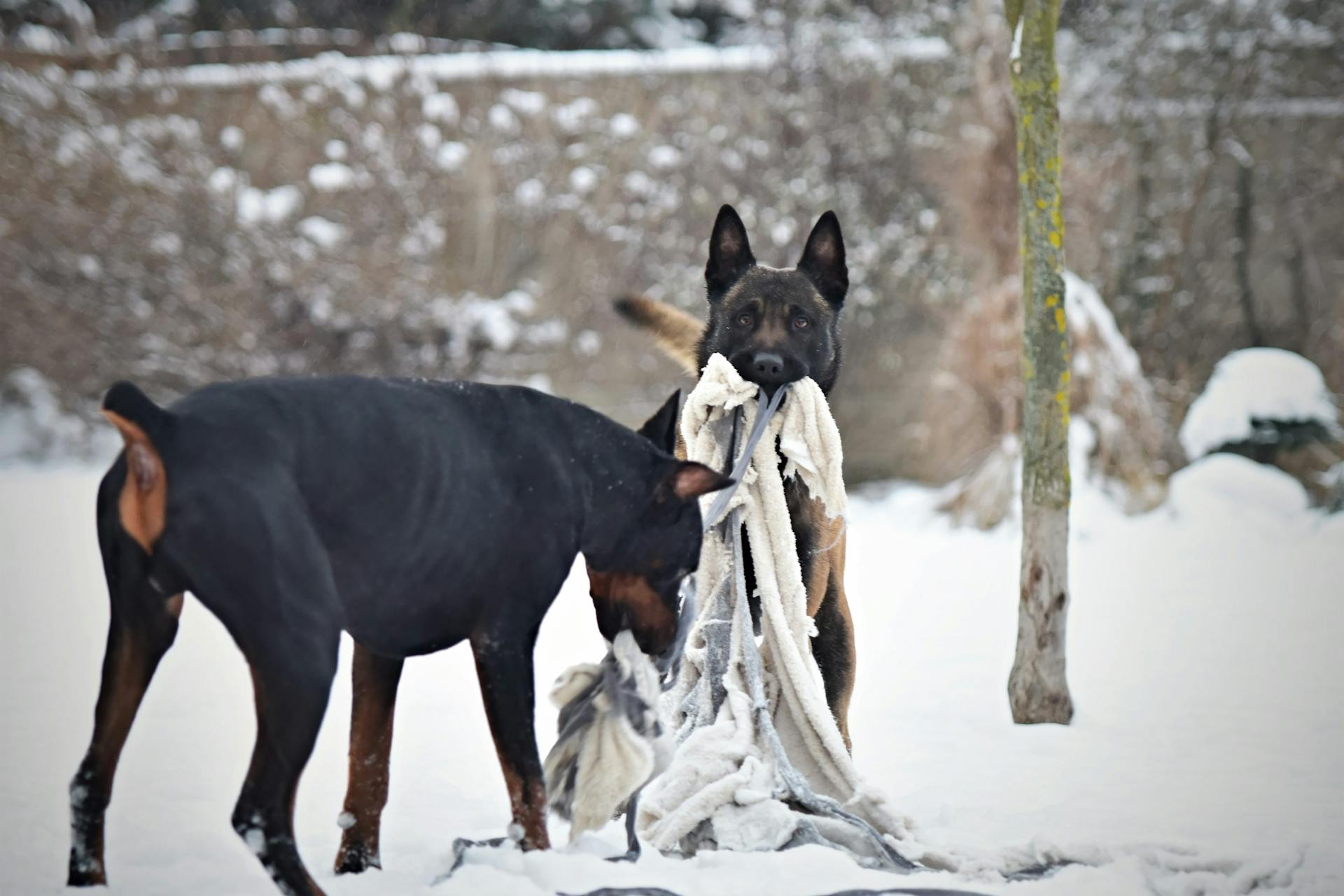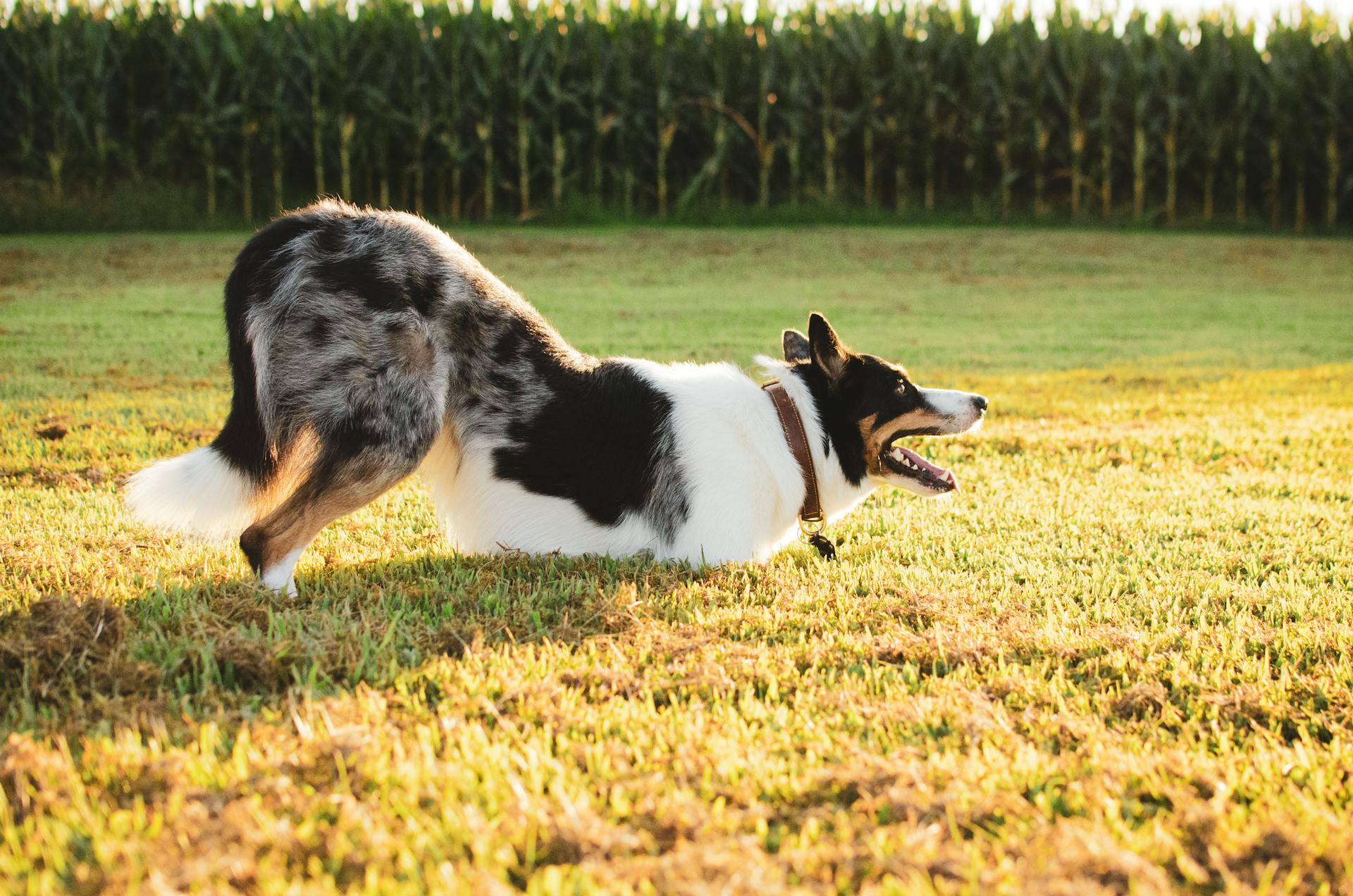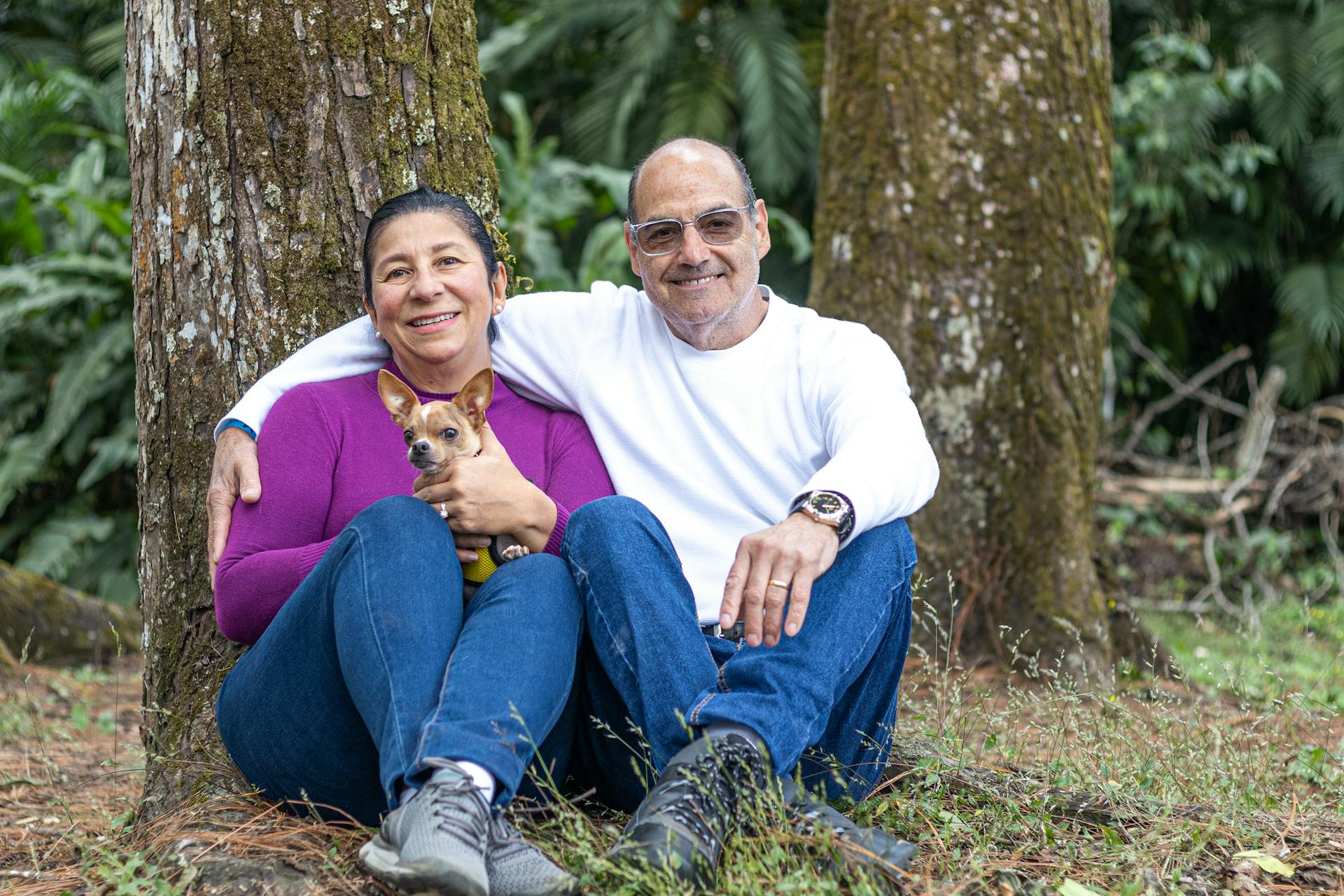
Merle Chihuahuas are a unique and captivating breed, known for their distinctive coat patterns and charming personalities.
Their merle coat is the result of a genetic combination that creates a mottled, patchy appearance, with a mix of solid and mottled colors.
Merle Chihuahuas often have large eyes, which can be a striking feature of their appearance.
Their ears are typically erect and pointed, adding to their overall alert and expressive demeanor.
In terms of size, Merle Chihuahuas can range from 6-10 inches in height and weigh between 2-8 pounds.
Their lifespan is relatively long, with an average of 12-18 years, making them a long-term companion.
Merle Chihuahuas are known to be intelligent and active, requiring regular exercise and mental stimulation to prevent boredom and destructive behavior.
Their affectionate nature makes them great companions, but they can be wary of strangers, so socialization is key.
Their small size means they can thrive in apartments or small living spaces, making them a great option for city dwellers.
Here's an interesting read: Why Are Chihuahuas so Small
Merle Chihuahua Genetics
The Merle gene is a game-changer for Chihuahua breeders and owners. It's a gene modifier that affects more than just coat color, influencing skin pigment and eye color as well.
The Merle gene is an incompletely dominant gene, meaning it doesn't completely override its recessive counterpart. This results in a unique coat pattern with irregular patches of dark-colored fur on a light-colored base.
The Merle gene affects the distribution of eumelanin, which controls black color in a Chihuahua's coat, diluting areas of the coat that are pigmented with eumelanin. This results in blue or red merle Chihuahuas, depending on the shade of their dark-colored fur.
Here's a breakdown of how the Merle gene is inherited in Chihuahuas:
Remember, the presence of the Merle gene can also lead to the birth of ghost Merles, which are Chihuahuas that carry the Merle gene but don't display the Merle coat pattern. If you suspect your Chihuahua is a ghost Merle, it's essential to have them genetically tested to ensure you're being an ethical owner and taking responsibility for their unique trait.
Gene Modifier
The Merle gene is a gene modifier that affects how other genes express themselves. This means it has a ripple effect on various aspects of a Chihuahua's appearance.
The Merle gene doesn't just stop at coat color; it can also influence skin pigment, resulting in light and dark spots beneath the coat.
How Gene Affects Dog Coat
The merle gene affects the distribution of pigment within a Chihuahua's coat. It specifically dilutes areas of the coat that are pigmented with eumelanin, resulting in irregular patches of dark-colored fur on a light-colored base.
The merle gene affects the distribution of eumelanin, which controls the black color in a Chihuahua's coat. Eumelanin is one of two pigments that govern a Chihuahua's coat color, the other being phaeomelanin.
Chihuahuas can have a wide variety of coat colors due to just these two pigments. The merle gene doesn't override the non-merle allele entirely, resulting in both genes being partially expressed when paired together.
Merle Chihuahuas can be classified as blue or red depending on the particular shade of their dark-colored fur. Blue merles have patches of black fur, while red merles have patches of brown or copper-colored fur.
Here's a breakdown of the two main types of merle Chihuahuas:
The merle gene affects more than just coat color. It can also affect a dog's skin pigment and eye color.
Gene Overview
The merle gene is responsible for the merle pattern in Chihuahuas and other breeds. It's a mutation of the non-merle allele (m) gene.
Chihuahuas inherit pairs of genes, one from each parent. All merle Chihuahuas have the Mm genotype, inheriting the merle gene from one parent and the recessive allele from the other.
The merle allele is an incompletely dominant gene, whereas the non-merle allele is a recessive gene. This means the merle gene doesn't override its recessive counterpart entirely.
A team of geneticists discovered the merle gene in 2006 while researching merle Shelties. They found extra DNA tacked onto the PMEL17 gene, which affects pigmentation.
The PMEL17 gene is responsible for pigmentation in dogs. Merle Chihuahuas and other merle dogs exhibit the same genetic mutation as merle Shelties.
Here's a quick rundown of how the merle gene affects breeding:
- Non-merle x non-merle parents: the entire litter will consist of non-merle Chihuahua puppies.
- Merle x non-merle parents: half of the litter on average will be merles and half will be non-merles.
- Merle x merle parents: half of the litter on average will be merles, one-quarter will be non-merles, and one-quarter will be double merles.
Merle Chihuahua Traits
Merle Chihuahuas are known for their unique coat patterns, which can be a mix of gray, brown, and black.
Their coats can also have a blue or red tint, depending on the genetics of the parents.
Merle Chihuahuas are generally smaller than other Chihuahua breeds, with an average weight of 2-8 pounds.
Their large eyes can be a variety of colors, including brown, blue, or merle.
Merle Chihuahuas are known for their big ears and long, pointed muzzle.
Their coats are also known for being soft and smooth to the touch.
Merle Chihuahuas are a relatively rare breed, making them a unique and special addition to any family.
Their high energy levels require regular exercise and mental stimulation to prevent boredom and destructive behavior.
Merle Chihuahuas are known for being loyal and affectionate companions, making them a great choice for families with children.
Their small size makes them a great choice for apartment living, as they require minimal space to roam.
For your interest: Red Merle vs Blue Merle
Merle Chihuahua Health
Merle Chihuahuas are more likely than other breeds to develop hearing and vision problems. This is due to the merle gene modifier.
The merle gene within the Chihuahua breed comes with an increased risk of congenital health issues. These issues can include being born deaf, blind, or both.
Merle Chihuahuas may also be more sensitive to the sun, especially those with shorthaired or smooth coats. This is because they have less fur to protect them.
Breeding two Merle parents together should never be done, as the risks for the pups being born with these conditions are extremely high.
Health Problems
Merle Chihuahuas have a higher risk of being born with hearing and vision problems.
The merle gene also makes dogs more sensitive to sunlight, especially those with shorthaired or smooth coats.
Some Merle Chihuahuas may develop full or partial deafness, skeletal problems, heart problems, and reproductive issues.
Breeding two Merle parents together is not recommended, as the risk of health problems in their puppies is extremely high.
Recommended read: Common Health Problems in Chihuahuas
In fact, the kennel club has banned the registration of Merle Chihuahuas due to these risks.
Breeding a solid-colored Chihuahua with a Merle may seem like a safer option, but studies have shown that many puppies born from this combination still develop health problems.
Around 25% of double-merle dogs are both fully deaf and fully blind, and they also have a higher risk of congenital deformities in their eyes and ears.
Blue Long Hair Health Issues
Blue Long Hair Health Issues can be a concern for Merle Chihuahua owners.
Merle Chihuahuas with blue long hair are prone to skin issues due to the unique characteristics of their coat.
These skin issues can lead to infections and irritation, which can be painful for your dog.
Their blue long hair can also be prone to matting, which can cause skin irritation and lead to further health problems.
Regular grooming is essential to prevent matting and skin issues in Merle Chihuahuas with blue long hair.
Their skin is also more sensitive due to their coat, making them more susceptible to skin allergies and conditions.
This sensitivity requires extra care and attention from their owners to prevent skin problems.
On a similar theme: Are Chihuahuas Good for First Time Owners
Merle Chihuahua Registration
The Merle Chihuahua is considered an undesirable color within the Chihuahua breed by the Kennel Club.
The Kennel Club stopped recognizing Merle Chihuahuas as purebred in 2010, and they can no longer be registered with the Canadian Kennel Club or the UK Kennel Club.
The American Kennel Club still allows Merle Chihuahua registration, but with certain conditions.
The Chihuahua Club of America also allows registration of Merle Chihuahuas, but they consider it an ethical breeding issue due to the complexity of the breed's colors and patterns.
Merle Chihuahuas can be difficult to breed, especially for a full blue coat, as the gene responsible for the color is recessive.
Cannot Be Registered with Some Groups
The Merle Chihuahua registration process can be quite complex, and it's essential to understand the rules and regulations set by different organizations.
The Canadian Kennel Club and the UK Kennel Club stopped recognizing Merle Chihuahuas as purebred in 2010, making them ineligible for registration with these groups.
The American Kennel Club still allows Merle Chihuahua registration, but with certain conditions, and the Chihuahua Club of America also registers Merle Chihuahuas, albeit with some reservations about the ethics of breeding them.
Breeding a Blue Chihuahua is particularly challenging due to the recessive nature of the gene responsible for the color, making it rare to find a Chihuahua puppy with a full blue coat.
The Kennel Club has a strict policy against registering Merle Chihuahuas, and they will not accept any Merle registrations, regardless of the dog's lineage or pedigree.
The Kennel Club's policy is based on concerns about the increased risk of impaired hearing and vision problems in Merle Chihuahuas, which is a significant factor in their decision to exclude them from registration.
Ultimately, if you're considering registering a Merle Chihuahua, it's crucial to check the specific rules and regulations of the organization you're working with, as some may be more lenient than others.
Explore further: Red Merle Australian Shepherd with Blue Eyes
What Do Breed Clubs Address?

Breed clubs play a vital role in promoting the health and well-being of Merle Chihuahuas by addressing genetic diversity.
Breed clubs work to establish breed standards that prioritize the health and well-being of the dogs.
Breed clubs often provide resources and support for responsible breeding practices.
They help promote the importance of genetic testing to identify potential health issues in Merle Chihuahuas.
Breed clubs also work to educate the public about the unique needs and characteristics of Merle Chihuahuas.
By doing so, they help prevent the inbreeding that can exacerbate health problems in the breed.
Merle Chihuahua Controversies
The controversy surrounding merle Chihuahuas is largely due to their greatly increased risk of health problems. Most breed registries won't register merles because of this risk.
Breeding merle Chihuahuas is never without risks, even if a breeder manages to produce a healthy litter. There's no guaranteed way to breed healthy merles without the risk of health issues.
A unique perspective: Are Chihuahuas Healthy

The practice of breeding merles is controversial because it contributes to the development of potential health problems within dogs of the breed. Even if an unhealthy dog never passes through your hands, by breeding or buying merle Chihuahuas, you're contributing to the problem.
The merle gene doesn't mutate spontaneously from the normal, non-merle version with any frequency. This is according to the president of the Australian Shepherd Health & Genetics Institute.
Breeding healthy merle Chihuahuas is a challenge because it's impossible to guarantee that one or more of the dogs in the litter won't have health problems.
You might enjoy: Dogs Chihuahua Mix
Merle Chihuahua Care
Taking care of a Merle Chihuahua's coat is a delicate process, as it can take up to two years to develop to its full thickness.
Their long coat requires regular brushing to remove dead hair and dander from the undercoat.
Requires More Attention
Merle Chihuahuas require a lot of attention, and it's not just because they're cute. They enjoy being pet and played with, which is a big part of their hyperactive personalities.

As needy dogs, Merle Chihuahuas thrive on interaction and can get anxious if left alone for too long. This is especially true for their owners, who need to make time for them in their daily routine.
Their high energy levels mean they need regular exercise and playtime to keep them happy and healthy. This can be as simple as a short walk or play session in the backyard.
For your interest: How Far Can Chihuahuas Walk
Long-Hired Bathing
Bathing your long-hired Merle Chihuahua requires some extra care to prevent matting and tangling of their beautiful coat. Brush the dog thoroughly to remove all loose hair and matted sections.
A basin or bathtub filled with approximately 4 inches of lukewarm water is perfect for bathing your Merle Chihuahua, and placing a rubber bathmat or towel at the bottom can prevent slipping.
To prevent slipping, place a rubber bathmat or towel at the bottom of the basin or bathtub.
Long Hired Brushing:
Brushing your Merle Chihuahua's coat regularly is essential to prevent matting and tangling.
The breed's long coat of soft, fine guard hairs can take up to two years to develop to its full thickness.
To brush your Merle Chihuahua's coat, start by gently brushing it with a pin brush or spinning pin brush with rubber tips when it's completely dry to avoid irritating the skin.
This helps to remove dead hair and dander from the undercoat.
Brush the coat afterward with a soft, natural bristle brush.
Finish with a gentle combing using a double-sided comb to lift the hair and comb it into place.
Discover more: Do Chihuahuas Have Hair or Fur
Long-Haired Drying:
Dry your merle chihuahua naturally in the warm sunlight if possible because many dogs dislike the noise of an electric hairdryer. This can be a calming and stress-free experience for your dog.
If the weather is cooler, you can dry your chihuahua by lying the dog down on a towel on the bed. This is a great alternative to using a hairdryer.
To use a hairdryer, set it on the lowest warm speed setting and blow the dog's stomach gently with the dryer held some distance away. This will help prevent overheating and discomfort for your dog.
While using a hairdryer, it's essential to monitor the heat at all times to avoid overheat your little pup. This will ensure a safe and comfortable drying experience for your chihuahua.
Long Hair Trim:
Merle Chihuahuas have a thick double coat that requires regular grooming to prevent matting and tangling.
Their long hair needs to be trimmed every 6-8 weeks to maintain a healthy coat and prevent hairballs.
Brushing their long hair daily can help prevent matting and tangling, but regular trims are still necessary.
Some owners prefer to keep their Merle Chihuahua's coat short, especially in hot climates, to prevent heatstroke.
Merle Chihuahua Rarity and Pricing
Merle Chihuahuas are often described as rare, unusual, or in short supply, which can drive up demand and prices.
Merle Chihuahuas are not as rare as breeders often claim, making up only about 1% of all Chihuahuas for sale.
Many breeders use the perceived rarity of merle Chihuahuas to justify higher prices, which can be seen as immoral and unethical by some.
The prices of merle Chihuahuas are often significantly higher than those of standard-colored Chihuahuas.
The Rarity of
Merle Chihuahuas are often described as rare, but are they really? According to Pets4Homes, a UK pet classifieds website, merle Chihuahuas make up just over 1% of all Chihuahua listings.
At the time of writing, there were 552 Chihuahua listings on the site, with only 7 merle dogs or litters advertised, which is a tiny fraction.
Merle Chihuahuas are often advertised as being rare, unusual or in short supply, which helps to add prestige to their ownership and keep demand high.
Breeders who sell merle Chihuahuas often describe this rarity as a unique selling point, without ensuring that prospective buyers understand why such dogs are rare.
Merle Chihuahuas are indeed rare, with only 7 out of 552 listings on Pets4Homes, which is a clear indication of their uncommon status.
On a similar theme: Chihuahua Sized Dogs
Pricing
Merle Chihuahuas often command prices much higher than standard colored Chihuahuas of the same breed.
This is because merle Chihuahuas are considered rare and special, leading many breeders and advocates to view the higher prices as immoral and unethical.
Merle Chihuahuas can change hands for prices that are significantly higher than those of equivalent standard colored Chihuahuas.
Merle Chihuahua Shows and Competitions
Merle Chihuahua Shows and Competitions are a great way to show off your dog's unique coat pattern. Merle Chihuahuas are eligible to compete in dog shows and competitions, such as the American Kennel Club (AKC) events.
Merle Chihuahuas can win awards in various categories, including Best in Show and Best of Breed. However, to participate in these events, owners must ensure their dog meets the AKC's breed standard requirements.
Merle Chihuahuas have been recognized by the AKC since 1904, making them a long-standing and established breed.
You might like: What Food Is Best for Chihuahuas
Are Dogs Competible in Shows?
Many people assume that merle Chihuahuas are prohibited from competing in the show ring. However, it's not entirely true.
The American Kennel Club (AKC) allows merle Chihuahuas to compete in the show ring. The AKC has added merle as one of the breed's standard markings.
The Chihuahua Club of America (CCA) voted against the disqualification of merle Chihuahuas by The Kennel Club (TKC). This decision allowed merle Chihuahuas to be registered with the AKC.
Merle Chihuahuas can be registered with the AKC, but their registration requirements are more stringent than those for non-merles.
Entering Dogs in Dog Shows
Entering dogs in dog shows can be a fun and rewarding experience for both you and your merle Chihuahua.
However, not all dog shows are created equal, and it's essential to understand the rules and regulations before entering your dog.
In the UK, the Kennel Club organizes and operates formal breed-specific dog shows.
To be eligible to enter a Kennel Club breed show, your dog must be registered with the Kennel Club and meet all the entry criteria.
Unfortunately, merle Chihuahuas are not eligible to enter Kennel Club breed shows, and if presented on the day, they would be disqualified and their registration revoked.
On the other hand, informal or fun dog shows, and dog shows that don't fall under the Kennel Club's umbrella, are generally open to all dogs.
Merle Chihuahua DNA and Testing
You can't rely on appearance alone to determine if your Chihuahua has the merle gene. There are cryptic merle Chihuahuas that look like non-merles.
A DNA testing kit is the best way to check your Chihuahua's genotype and determine whether he's a merle. Many breeders use DNA testing kits to ensure they don't accidentally breed double merles.
Here are some top DNA testing kits for merles:
- Embark
- University of California, Davis
- Paw Print Genetics
DNA Testing Kits
DNA testing kits can be a game-changer for Chihuahua owners and breeders alike.
You can't rely on appearance alone to determine if your Chihuahua has the merle gene. There are cryptic merle Chihuahuas that look like non-merles.

To determine your Chihuahua's genotype, you can use a DNA testing kit. These kits will reveal the exact genotype, such as mm, Mm or MM.
Many breeders use DNA testing kits to ensure they don't accidentally breed double merles. Breeding a merle sire to a merle dam may result in double merles in the litter.
To avoid this, breeders can use a DNA testing kit to check the genotype of the sire and dam. If the merle gene is present in both, they shouldn't be bred.
Some top DNA testing kits for merles include Embark, University of California, Davis, and Paw Print Genetics.
Here are some of the top DNA testing kits for merles:
- Embark
- University of California, Davis
- Paw Print Genetics
What Is a DNA Test?
A DNA test is a type of genetic analysis that examines an individual's DNA to identify specific genetic markers or traits. It works by comparing the individual's DNA to a reference sample or a database of known genetic traits.
Readers also liked: Personality Traits of Chihuahuas
DNA tests can be used to determine an individual's ancestry, identify genetic disorders, or predict characteristics such as eye color or coat type. This is particularly useful for breeders and owners of purebred dogs like the Merle Chihuahua.
A DNA test typically involves a simple cheek swab or blood sample that is sent to a laboratory for analysis. The results are usually provided in the form of a genetic profile or a report on the individual's genetic traits.
Some DNA tests are designed to identify specific genetic markers associated with certain traits, such as the Merle gene in Chihuahuas. This information can be used to make informed breeding decisions or to identify potential health risks in individual dogs.
Merle Chihuahua Buying and Commitment
Buying a merle Chihuahua can be a costly endeavor, with prices ranging from $2,000 to $10,000.
The price tag is a direct relation to the dog's beautiful coat.
Many health conditions come with owning a merle Chihuahua, so be prepared for additional costs.
You may want to inquire about the parents of the puppy to ensure they aren't both merle, as this increases the risk of health issues.
If you do decide to purchase a merle Chihuahua, take responsibility for the dog's health and provide the necessary care.
Frequently Asked Questions
What is the lifespan of a merle Chihuahua?
The average lifespan of a Chihuahua, regardless of coat pattern, is between 12-18 years, with some living up to 20 years. Merle Chihuahuas have the same lifespan as other Chihuahuas.
Sources
- https://ilovemychi.com/facts-about-merle-chihuahuas/
- https://www.pets4homes.co.uk/pet-advice/merle-chihuahuas-the-truth-and-facts-about-the-merle-chihuahua.html
- https://medium.com/@shakeelnasir615/all-information-about-merle-long-haired-chihuahua-b2436a4a797
- https://www.chihuahuawardrobe.com/what-is-a-merle-chihuahua/
- https://chiwawadog.com/merle-chihuahuas/
Featured Images: pexels.com


